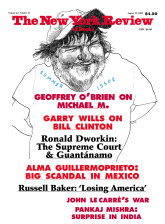To the Editors:
Michael Massing’s February 26 article on the press and weapons of mass destruction [“Now They Tell Us”] was a devastating account of willful blindness at high journalistic levels; the piece deserves all the attention and praise it’s received. His June 24 follow-up [“Unfit to Print?”] is less convincing. The central argument is not easy to grasp, because the piece keeps shifting and expanding the scope of its criticism—aiming first at The New York Times’s post-invasion coverage, then widening the attack to “embedded” reporting in other leading American papers, before finally taking on the whole American press corps in Iraq and concluding: “The question for American journalists is whether they really want to know what the Iraqis themselves, in all their complexity, are thinking and feeling.” The question implies a serious charge. Is it true? Possibly. But to make the case stick would demand more legwork and care than Massing—ordinarily the most conscientious of writers—shows in this article. The evidence is thin and highly selective. For example, he criticizes Pamela Constable of The Washington Post, who was “embedded” with the Marines during the battle of Falluja in April, for misunderstanding what she thought was a muezzin’s call to prayer, and which was probably, though not certainly, a call to ambulances and arms. (This detail appeared in a piece in which Constable candidly described just how limited the journalists’ access to Fallujans was.) But Massing doesn’t mention that, as soon as she was back in Baghdad, Constable wrote a story about Iraqi families whose houses and lives had been wrecked in a car bombing—a piece that showed nothing but an effort to find out what Iraqis were thinking and feeling. The same could be said of numerous stories by numerous journalists, including some of Massing’s other culprits.
Massing is a longtime supporter of the Committee to Protect Journalists, and he knows the extreme dangers faced by reporters in Iraq. Yet this knowledge fails him when he mentions the problems of “access” and then immediately downgrades them to problems of “attitude.” In order to talk with Iraqis, American reporters dart in and out of embattled cities in armored cars, risk gunfire and kidnapping, hide under abayas and kaffiyehs, and, as a last resort, send out Iraqi staffmembers, who are at slightly lower risk. It’s hard to know what more they could do, or what these efforts reveal about their “attitude,” other than that they want to stay alive while finding out what Iraqis think and feel.
It’s almost certain that American journalists in Iraq have failed to do complete justice to this vast and complex story. As a start, American television could improve its coverage by including more footage from the Arab satellite channels. But before issuing a broad indictment against colleagues working in unbelievably difficult conditions, I would have made sure that I had adequately imagined their circumstances, considered the whole of their work, and asked myself if I was being fair.
George Packer
Brooklyn, New York
Michael Massing replies:
George Packer has thoroughly misread my article. I did not “downgrade” the dangers that journalists face in Iraq. On the contrary, I described how the recent upsurge in violence in Iraq has turned much of the country into “a no-go zone” for journalists, and I cited a report by the Committee to Protect Journalists that details the many dangers they face. My piece focused in part on how the violence has affected news coverage and how reporters have tried to deal with it. I argued not that reporters should take more risks—that would be suicidal—but that they should find additional ways of covering the news, including the use of reporting from Arab and European news organizations and from wire services. Packer’s suggestion that American TV include more footage from Arab satellite channels comes directly from my piece.
As for examples, I provided at least a half-dozen instances of what I considered faulty reporting on the part of The New York Times, plus other examples involving The Washington Post, the Los Angeles Times, NPR, and CNN. Packer, by contrast, cites just one example of his dissatisfaction with my piece—my comments on Pamela Constable. Nowhere did I suggest that Constable has not done good reporting; on the contrary, I called her a “fine reporter.” Rather, I cited her account of her experiences in Falluja as exemplifying the problems that journalists face in Iraq today, including security, language, and the restrictions imposed by embedding, including acceptance of government restrictions on what can be reported. The extent to which embedding affects news coverage has been the subject of intense debate among journalists ever since the Pentagon introduced the arrangement prior to the war. I suggested that in the interests of accuracy and fairness to readers, reporters should at least acknowledge that they are writing under the conditions imposed by embedding. Such conditions, moreover, are only part of the larger problem of embedded journalists seeing things from the perspective of those protecting them. Packer simply ignores these issues.
On one point, I do agree with Packer: US journalists in Iraq have done excellent work in the face of grave danger, and they deserve credit for it. I welcome his having repeated this. I just wish that he had not misrepresented my article in doing so.
This Issue
August 12, 2004



